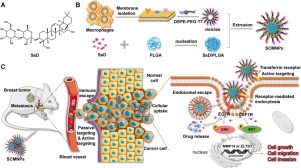Applied Materials Today ( IF 7.2 ) Pub Date : 2019-11-24 , DOI: 10.1016/j.apmt.2019.100505 Kaiju Sun , Wenjing Yu , Bai Ji , Changbao Chen , Hongmei Yang , Yangyang Du , Meiyu Song , Hongqiao Cai , Fei Yan , Rui Su

|
Breast cancer remains the most frequently diagnosed malignancy among women worldwide. Although effective, numerous treatment strategies have been developed, which suffer from severe side effects due to high toxicity and low specificity. Thus, alternative drugs with promising anti-tumor activity, less toxicity, and high therapeutic index are highly desirable. Saikosaponin D (SsD), a triterpene saponin derived from Bupleurum, exhibit potential therapeutic properties for cancer therapy. However, severe side effects and systemic toxicities due to poor pharmacokinetics and non-specific distribution of SsD in vivo limited its applications in clinical trials. Therefore, to overcome these limitations and enhance the therapeutic efficiency of SsD, herein, we developed a macrophage-biomimetic drug delivery system by coating macrophage membrane hybridized with T7 peptide on the surface of poly (latic-co-glycolic acid) nanoparticles (SCMNPs). Remarkably, SCMNPs demonstrated targeted specificity to cancer cells with the characteristics of immune escaping, selective accumulation, and enhanced cell endocytosis. Moreover, SCMNPs effectively inhibited tumor growth and metastasis of breast cancer in vitro and in vivo through VEGFR, AKT, and ERK related to the angiogenic pathway. In conclusion, a rationally developed novel SsD-based biomimetic strategy via the biological properties of macrophages presents a complementary therapeutic paradigm for precise and effective breast cancer therapy.
中文翻译:

载有皂苷D的巨噬细胞膜仿生纳米颗粒靶向用于乳腺癌治疗的血管生成信号
乳腺癌仍然是全世界女性中最常被诊断出的恶性肿瘤。尽管有效,但已经开发出许多治疗策略,由于高毒性和低特异性,它们具有严重的副作用。因此,非常需要具有前途的抗肿瘤活性,较低的毒性和高的治疗指数的替代药物。柴胡皂苷D(SsD)是衍生自柴胡的三萜皂苷,具有潜在的癌症治疗特性。但是,由于药物动力学不良和体内SsD的非特异性分布,导致严重的副作用和全身毒性限制了其在临床试验中的应用。因此,为了克服这些局限性并提高SsD的治疗效率,在本文中,我们通过将与T7肽杂交的巨噬细胞膜涂覆在聚(乳酸-乙醇酸)纳米颗粒(SCMNPs)的表面上,开发了一种巨噬细胞仿生药物递送系统。值得注意的是,SCMNPs具有针对癌细胞的靶向特异性,具有免疫逃逸,选择性积累和增强的细胞内吞作用的特征。此外,SCMNPs通过与血管生成途径相关的VEGFR,AKT和ERK在体外和体内有效抑制乳腺癌的肿瘤生长和转移。总之,一个理性开发新的基于SSD的仿生战略通过 巨噬细胞的生物学特性为精确有效的乳腺癌治疗提供了一种互补的治疗范例。











































 京公网安备 11010802027423号
京公网安备 11010802027423号